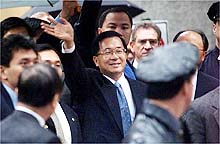|
|
|
|---|---|
Taiwan Leader Greeted in U.S. With Protests and Warmth |
|
|
May 22, 2001 By Sarah Kershaw The Taiwanese president, Chen Shui-bian, arrived in New York to fanfare and some protests last night, welcomed by local and Congressional politicians and by a Chinese community divided over his visit. 
It was the first time a leader of Taiwan had visited the city. And as Mr. Chen made his way from Taipei to Midtown Manhattan, Taiwanese and mainland Chinese immigrants in the city found themselves drawn into the longstanding international dispute over Taiwan. Mr. Chen, the leader of an island of 22 million people that Beijing considers a renegade province, met last night with about two dozen members of Congress at the Waldorf- Astoria and was scheduled to meet today with Mayor Rudolph W. Giuliani, who planned to give him a key to the city in a closed-door ceremony with the trappings usually due a head of state. The United States does not recognize Taiwan as a country, and its status has been the focus of sometimes sharp dispute between the United States and China, ever since the Nationalist Chinese leaders fled there in 1949 after the Communist takeover. Most recently, President Bush seemed to take the policy a step further by saying the United States would do whatever it took to defend Taiwan, but he qualified his remarks later by saying Taiwan should not declare independence or provoke a Chinese attack. To the thousands of Chinese immigrants who live and work in relative peace with one another in New York, largely in Chinatown and Flushing, Queens, Mr. Chen's arrival has fueled a prickly debate between those with roots on Taiwan and those from mainland China. These days, the two groups have been at odds, arguing inside restaurant kitchens and on buses and subways, or trading political barbs across the pages of the city's Chinese-language newspapers. "I am calm," said William Wu, a chef who came to Flushing from Taiwan 13 years ago and works with waiters from Beijing at a restaurant in Hicksville, on Long Island. "But the people from mainland China, it's very hard for them to be calm." Calm was not the prevailing sentiment last night when Mr. Chen arrived about 6:30 p.m. and was whisked into the Waldorf-Astoria, his wife, who uses a wheelchair, by his side. Outside the hotel were about 1,000 supporters along Park Avenue at 50th Street, waving the green and white flag of the Democratic Progressive Party, and shouting "Long live Taiwan!" On another corner, at 49th and Park, stood the pro-China demonstrators, numbering about 500 but making more noise, shouting, "Defeat independence!" and waving the gold and red Chinese flag. George Hua, an organizer of the pro-China rally, who immigrated from mainland China in 1968, lives in Manhattan and works as a translator at the United Nations, was running up and down Park Avenue with a megaphone, urging the protesters to chant louder. "We Chinese have our political wisdom," Mr. Hua said during a break. "We don't need anyone interfering." Several members of Congress stopped in the hotel lobby to speak to reporters after meeting with Mr. Chen. "In this country, we come from all parts of the world, every race, every religion, and there's one thing that ties us together," said Dana Rohrabacher, a California Republican. "And that's a love of liberty and justice and democracy. We break away from that, we're breaking away from our own roots. Tonight we are reaffirming what America stands for by being here to welcome President Chen, the democratically elected president," he said, drawing out the syllables of the last three words. In yesterday's World Journal, the largest and most influential Chinese- language daily newspaper in the city, two advertisements appeared, each staking a position on Mr. Chen's visit and the Taiwan question. A full-page advertisement, on Page 7, welcomed him, and a half-page advertisement, on Page 9, denounced the visit and accused the Taiwanese leadership of using his New York stopover as a backhanded way of achieving a closer relationship with Washington. Taiwan has sent thousands of immigrants to New York City over the last 35 years, and its president is a much-admired figure to the Taiwanese here. The 50-year-old Mr. Chen, who grew up on a farm and is viewed by many Taiwanese as a charismatic populist, is something of a hero, even to those who have not returned home since arriving. The Nationalist Party, the political successor of the government that fled the Communists in 1949 under Chiang Kai-shek, controlled the Taiwanese government until Mr. Chen was elected last year. His race was so hotly contested that many Taiwanese watched it closely. To immigrants here from mainland China, particularly those still loyal to the Chinese government, Mr. Chen's stop in New York is yet another affront, a diplomatic dig with a New York twist. And Mayor Giuliani's ceremonial greeting of Mr. Chen, and his plan to declare support for an independent Taiwan, worries them. "I think it's not wise to provoke either side," said a computer scientist, Min Wang, who came to Jersey City five years ago from mainland China. "It could cause some serious international problems." While Mr. Chen's activities last night and today, including a stop later today at the Metropolitan Museum of Art, are closed to reporters, his foray into the city appears to be anything but low key. It seems that no matter how sensitive the situation, there is no room for subtlety in New York City. |
|
